- Home
- Jane Smiley
Barn Blind Page 21
Barn Blind Read online
Page 21
Afterward, when she said, “Everyone in the saddle. Let’s give a few of these animals a little exercise, anyway,” Margaret and Henry refused, and Axel fixed her with a strange, long look that shamed her, so she said, heartily, “Fools to mope,” knowing she sounded wrong and unmotherly.
“Mope?” said Axel.
“Well . . .” Kate smiled slightly, nakedly.
“Mope?”
Her black dress was wool, binding at the neckline and arm-holes, pricking her at the waist. She fingered the narrow belt. She would undress and put on clean shorts, then walk out to the broodmare pasture. Axel stepped close to her and put his hand lightly on hers, stilling the fingers. “Mope?” he said again.
“For God’s sake, Axel!” Grief of the sort everyone expected had always been beyond her. She was terrific at nursing, arranging, caring for, galvanizing, steadying, breaking the news, but bad at this. “It was an accident!”
“Accident?”
“Well, of course!”
“Accident?”
Kate’s mouth opened slightly and she blinked, wanting suddenly to say, Axel? Axel? as if he were unconscious, or some awful nineteenth-century thing had happened to his reason, but when he said “Accident?” again, she realized that she had mistaken skepticism for confusion.
“Who did it?” she flared up. “You didn’t do it! The horse didn’t do it! I didn’t do it! It happened! That’s all, it happened!”
Peter appeared, dressed impeccably, a bit more formally than usual, and he said, “Nothing’s had a bit of work since Sunday.”
When she had changed her dress and met him at the stable, he did not mount, but walked beside her out to the training field, MacDougal’s reins over his arm, the horse sniffing and blowing companionably behind. She found her chair and set it in the usual spot, but did not sit down. He mounted, and when he drew up to lengthen his stirrups, she adjusted the one on her side, then held it for his foot, and though she did it idly, as if not doing it at all, he knew it was unaccustomed behavior and appreciated its significance. She said, “I want you to pay close attention to his walk today. Try and sense the freedom of a free walk, the tightness of a collected walk. I want you to feel not that he’s slowing down or speeding up, but that he’s drawing his spine together or stretching it out. It may bore you, but let’s spend most of the lesson time on the walk, O.K.?” When had she cared about boring him before?
He said, good student, “You always think jumping is going to be the hardest, but it’s the simplest once you get going.”
“Yes.”
“One, two, three, four,” she continued in a moment. “The walk is utterly foursquare, utterly deliberate, utterly straightforward.” One. Two. Three. Four. Plop, plop, plop, plop. She loved the delicious and never sudden fall of hooves in the dust, the fluid alternation of movement in haunches, in shoulders, in the gay bobbing of MacDougal’s head. The sound and the movement called forth the knowledge she had spent almost forty years accumulating, knowledge of bones and tendons and muscles and skin, of tact and strategy, of rules and the exceptions to rules. She closed her eyes. One, two, three, four, and the creak of leather and the jangle of hardware, and the fragrance of a breath of wind, just for a moment, all of these repeated things soothing her, calling from her her own repeated instructions. “Oh, dear,” she thought, as she opened her eyes and her spirits rose. John, of course. But her spirits rose. She had not cried since the accident (“Accident?” said Axel) and now she was almost happy. “Collect him now, just a little!” and then, “Let him go!” One, two, three, four, she was lulled, and let herself believe that all things are repeated, that nothing is lost, that no one is at fault.
John. Of course. Her son, bone of her bone, the child in the womb (the first movements had always felt like air bubbles popping, then there had been the swimming from place to place, then the elbows and feet that had reassured her of their completeness). Since the accident where had been her motherly tears? Where her tender reminiscences? He still angered her, and now her spirits were rising, foolish, clown-faced. She cleared her throat. “Try a little posting trot to loosen him up a bit!”
In a moment she shouted, “Very good!” and Peter looked up startled at the pleasure in her voice. She was beaming on him. The hand shading her eyes seemed as much for the sake of protecting the world from their brightness as of protecting them from the sun. He sat up straighter and shortened his reins. MacDougal pulled his lips back and champed his teeth on the bit, but he did not seem to want to misbehave and Peter sensed this precisely, as if his body were a seismograph. He looked again at Kate, feeling for a moment that he of all the family was about to learn a lesson that she had to teach.
Peter, too, newly appreciated the slower gaits today. Any other exercise would have seemed sudden, clamorous. At the walk and trot he was beginning to feel his senses open up and mesh with one another. This, while it excited him, also frightened him; he had not expected to achieve anything for some undefined but proper number of months after John’s accident. A plateau in his progress, if not downright retrogression, was what he owed to the fraternal relationship, but this improvement, he thought, must be part of the lesson, part of the reason that he and she were out here, active in the sun, and the others were hidden away.
“Take him over the wall,” she called. “You look beautifully collected and in control.”
There was not an inch of this training field that he did not know, where he did not have a dim or a clear memory of fright or hesitation. The stone wall was in a dip. How precipitous the incline had seemed when he was twelve, galloping around on Fried Pie and yearning to grab the pommel of his saddle. Now, on MacDougal, his approach, his response, his recovery were perfectly smooth. He turned toward the barrel jump. Kate, he knew, had not always liked him, perhaps had not liked him for the majority of his life. In the past, when he was praised for his schoolwork and received high grades, her eyebrows lifted, skeptically, doubting, with this evidence, the quality of the school. On horseback he had often exasperated her with the fog and slowness that he too found so exasperating but so uncontrollable. And he was no less tall these days, no less wincingly clumsy at times. Henry had always been the favorite, or perhaps John had been. Even Margaret, a few years ago, had taken every blue ribbon in sight and mother had treated her carefully, attentively. But now Kate was shining on him.
He took the barrel jump. It was perfectly pleasurable.
Perfectly pleasurable.
Just then it seemed that he had years to go before he neared the bottom of that pleasure, years of increasing strength and knowledge, years of books as well as horses, years of strategy and imagination, years of delight and fatigue and the renewable satisfaction of delight. Here was mother, a case in point, who had been around horses for almost all her life, and who still circled, tigerishly, this one pursuit. This, he thought, might be another part of the lesson that she had to teach him, knowledge of the unplumbable activity, the activity that no lifetime could encompass. He saw himself grown up, settling into an armchair, perhaps with a pipe, knowing what to do with his body, his hands, and his time, knowing that, however long he did it, he would always want to do it again, better. “Wake up!” she shouted, but her admonishment, as old as he was, was today light-hearted. He smiled, shyly at first, fearful of the gladness he felt. He wanted to be good. He always wanted to be good. His smile strengthened. MacDougal trotted briskly, flicking his ears and rolling his bits with his tongue. With a selfishness that felt like both victory and defeat, Peter took this happiness into himself and set up a guard around it.
Casually Kate stretched, then rested her palms on the top of her head. She was desperate with happiness and needed the matter-of-fact comfort of her hair and skull. Peter and MacDougal soared over the barrels, then slowed to a trot, a walk, a halt. The horse dipped his chin and backed four steps, then, reins loosened, dropped his head and walked forward—light, graceful, ready for anything. They were very good, these two. They were very good, they we
re very good, they were very good. The Team, the Team, the Team. Before her she saw the product and goal of forty years of effort. On top of her head, her hands clenched into fists.
John, of course. But that boy seemed already small with distance, whereas Peter and MacDougal were enormous and growing, on the verge of eating her up. She thought of Peter on the Team, of Peter in Europe and South America. He need never be any better than he was right now and he would do well in those places. Her son, bone of her bone. They appeared together in her imagination, John in the highchair, strapped in because he had already wiggled out twice, and Peter perched on two telephone books, one bouncing and banging his tray table with his cup while squealing in time to his bounces, the other grave and already distracted, spiraling his peanut butter sandwich with careful half-moon bites. And she heard her own voice, chronically annoyed, saying, “Hurry up! Hurry up!” (she’d wanted to get on with her stable work). They had been, everyone said, darling little boys. The way that this memory dovetailed with her now frightening happiness and the glittering visions of Peter and MacDougal superbly accoutered amidst great green lawns felt like a disease of the soul. She gave a bitter groan and Peter turned Mac away, politely ignoring her.
She fixed her eyes on the weathervane atop the barn. Trotting west today. The little black horse trembled then, as the wind picked up, and knocked in its iron socket. With an effort of will larger than any of her willful life, she closed her eyes and ordered the images. When she opened them at last, Peter stood before her, and she wanted for him what she had always wanted for him, or someone, and the ground she stood on was hers again, again perfectly familiar through the soles of her oxfords. They circled and circled the training field, Peter on MacDougal, Kate usually at his side talking, often repeating herself. Twilight closed in on them, but the horse went around still, and the humans, without mentioning it, made no move toward the fragmented, stuffy, unbearable house.
On the screened porch, Axel, who could hear them sometimes, fell out of love with his wife and put his face in his hands. The darkness thickened. He went to the door and shouted, “Margaret!” but the house was silent and Margaret and Henry had disappeared.
“Margaret!”
She sat up instantly, opened her eyes even before she was awake, and said, “Yes? Henry?” without really knowing what she was talking about.
“I can’t sleep.”
“Wait a minute!” She spoke impatiently: the rising, the bundling together of her wits was so laborious, so slow. Henry stood quietly in the doorway, his pajamas glowing in the dark. “O.K.,” she said at last. “Say, close the window, would you?” It had turned cool already. John, she remembered, was dead. Since the horse show, she had been waking from these deep, invertebrate sleeps to no knowledge, then to that knowledge, then everything else. Henry closed the window. When he sat on the bed, he had nothing to say, and Margaret had nothing to say, either, but it was reassuring to listen to his breathing.
John’s accident, it seemed, had frightened them all speechless, speechless and embarrassed. It was a thought she had entertained before. (Lately she entertained lots of thoughts, layers of thoughts. Every feeling or perception nested in boxes inside boxes of speculation about why and how she felt and perceived. Nothing seemed to touch her deeply, except that it was impossible to stop thinking, and she had had menstrual cramps for nearly ten days.) There had not been much overt grieving from members of the family. If you saw soundless tears you did the person a favor and turned away. Mother, Margaret thought, would have preferred it even cleaner, would have preferred that, given his death, John had never lived at all. Then Margaret wondered again why the accident had rendered Kate so inhuman in her eyes, so that she could imagine her mother doing the most grotesque, unfeeling things, when actually she had simply done all the normal things: arranged for the funeral, gone to Mass, prayed, striven to achieve a semblance of normality around the place.
“. . . run away,” said Henry.
“Please don’t.”
“But I came back just then. At that very moment, I came back.”
“What?”
“Well, really about ten minutes before, but it was almost right then.”
“What are you talking about?”
“I said, I tried to run away that day, but I came back just in time.”
“Where did you run away to?”
“I got to town. I had plenty of money, and a bunch of clothes and food and stuff.”
“That’s twelve miles from here.”
“You’re telling me.” His back had slid so far down the wall that his neck, now at right angles to his body, looked broken. “Sit up,” snapped Margaret.
He sat up, too preoccupied not to take orders, and went on. “I wasn’t all that tired. I’ve been practicing since the beginning of the summer.”
“Practicing what? What are you talking about?”
“Running away. I ran away. I’ve been riding my bike all summer, and I can ride up both sides of the driveway, and so when I got to town, even though it’s twelve miles, I wasn’t all that tired. I could have gone on for a long way. It was only noon, but I wanted to come back.”
Margaret pulled the sheet up. “I should think so.”
“Why? I had plenty of money and my raincoat and everything.”
“I can’t imagine your running away in the first place.”
“You can’t?” He turned and looked at her with completely uncynical wonder, and suddenly she could. In fact, suddenly it seemed like the most splendid, exciting, European idea, compounded of the sea and rain-washed golden pavements, and cozy perilous snowstorms remembered in comfortable old age. But she spoke skeptically. “Oh, come on. What would you do?”
“Make money.”
“Sure. Doing what?”
“Anything.”
“I’ll bet.” She was smiling, though, for in spite of her better judgment about high school diplomas and college educations, the thought had taken her over. She remembered John saying, “Margaret, don’t you realize how many things there are?” and now she could see them: sailboats on sunlit oceans, avenues of shops, carved jades in velvet cases, aisles of books, rows of paintings, corridors leading from hospital rooms to labs to doctors’ lounges. She imagined office buildings netted with telephone wires, whirring with business, and she thought of cool, dim, tableclothed restaurants where, at every place setting, the perfect food was being eaten. Henry said, “I can,” and she said, “What?”
“Make money.” He sounded so deliberative, so adult, that she looked at him suddenly. His pajama top was half open, buttons gone, no doubt, and she could see his chest, thin, smooth and cylindrical. His little ribs relieved and saddened her. She said, “Well, I guess you probably can, but you could make more of it if you finished your education.”
“We’ll see.”
“Yes, we’ll see.” She made it sound like a promise, although what she was promising and how she would fulfill it she hadn’t the least notion of. Still, with the thought of all those things that there were, all those places, and all those people with jobs, it seemed that any promise could be made, and that the mere making brought it closer to coming true.
Henry slid down the wall again and moved slightly away from her. Twice he opened his mouth, but closed it without saying anything.
“What?” she said, but he shrugged, muttering, “Nothing,” and shaking his head. She smiled. He had made her happy. For the first time in days she felt happy. “What?” she said. “Tell me.”
“You sound happy.”
“Maybe I am. Talking to you makes me happy.”
“Oh, yeah?”
“Yeah.”
At this he moved even farther away, and averted his head entirely. He mumbled something.
“What?”
“I said, ‘I don’t think we should be happy.’”
“Maybe not,” but this was not enough for him. He stood up. “Goodnight. Sorry I woke you up.”
“Stop muttering and sit down.
”
He shuffled his feet and scratched his head, shorn of all adulthood now. “Come on, sit down.” He sat down, but remained silent. With tact that made her feel deliciously competent, she waited. At last, panicked that he was about to cry, Henry uttered, “I missed him.”
“We all miss him.”
“I mean, I missed him then, when I ran away and got to town.” His voice, shrinking from the mortification of tears, rose nearly to a squeak. “That’s why I came back.”
“What? I can’t hear you.” She put her hand on his knee and he pretended it wasn’t there.
“I . . .” He took a deep breath. “I came back. I came back.”
Instantly she grabbed him and pulled his head to her chest. His hair, which mother had made him wash just before bed, was very fragrant, and she put her face in it. She could feel his tears running down her nightgown, seeping through and warming her skin. He was still talking, but she couldn’t listen because the moisture seemed of such frightening, riveting intimacy. She felt it on her breasts, her abdomen, spreading, as if it would soak her whole body. And his body was shaking hers, his sobs wrenching her, as if by osmosis. She had done her crying, oddly, for months before the accident rather than since. These days she hadn’t any tears left, and she did not feel guilty. Now, however, it seemed to her that she was crying by proxy, and she felt the emotions of tears: relief, embarrassment, the welling up of grief that grieves for itself as well as for the loss. She sat, holding and held, her face in his hair, for a very long time.

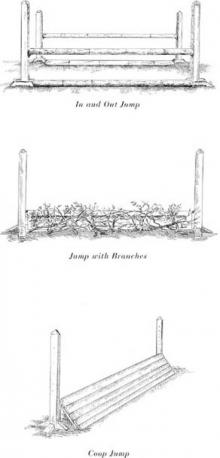 The Georges and the Jewels
The Georges and the Jewels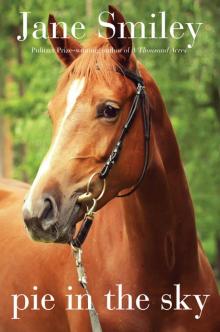 Pie in the Sky: Book Four of the Horses of Oak Valley Ranch
Pie in the Sky: Book Four of the Horses of Oak Valley Ranch Duplicate Keys
Duplicate Keys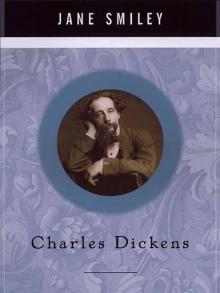 Charles Dickens
Charles Dickens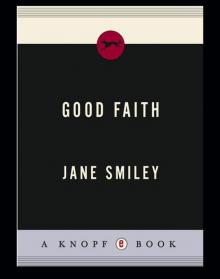 Good Faith
Good Faith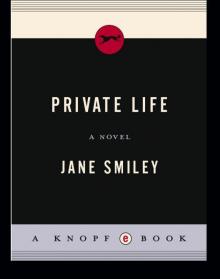 Private Life
Private Life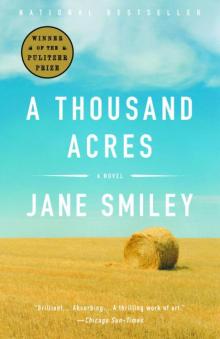 A Thousand Acres: A Novel
A Thousand Acres: A Novel The Greenlanders
The Greenlanders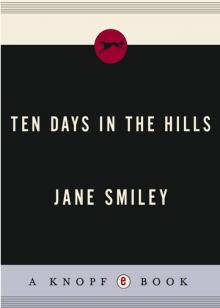 Ten Days in the Hills
Ten Days in the Hills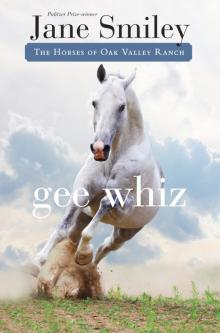 Gee Whiz: Book Five of the Horses of Oak Valley Ranch
Gee Whiz: Book Five of the Horses of Oak Valley Ranch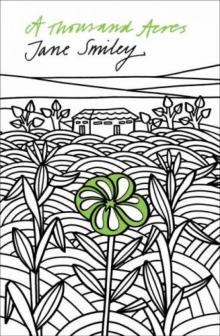 A Thousand Acres
A Thousand Acres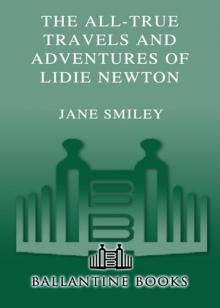 The All-True Travels and Adventures of Lidie Newton
The All-True Travels and Adventures of Lidie Newton Ordinary Love and Good Will
Ordinary Love and Good Will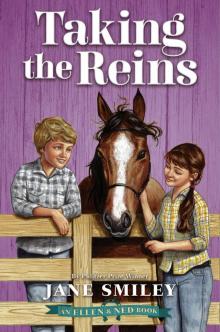 Taking the Reins (An Ellen & Ned Book)
Taking the Reins (An Ellen & Ned Book) The Man Who Invented the Computer
The Man Who Invented the Computer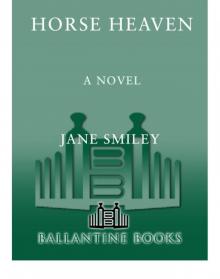 Horse Heaven
Horse Heaven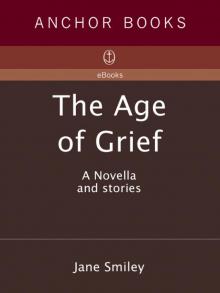 The Age of Grief
The Age of Grief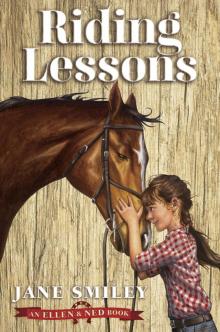 Riding Lessons
Riding Lessons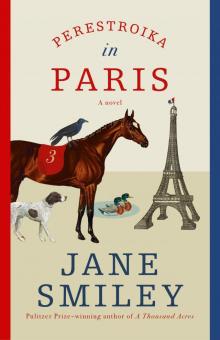 Perestroika in Paris
Perestroika in Paris A Good Horse: Book Two of the Horses of Oak Valley Ranch
A Good Horse: Book Two of the Horses of Oak Valley Ranch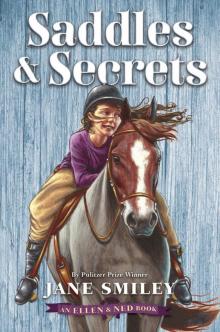 Saddles & Secrets (An Ellen & Ned Book)
Saddles & Secrets (An Ellen & Ned Book)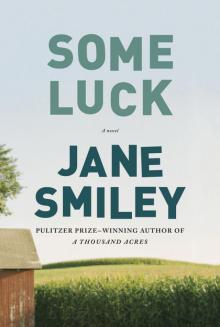 Some Luck: A Novel
Some Luck: A Novel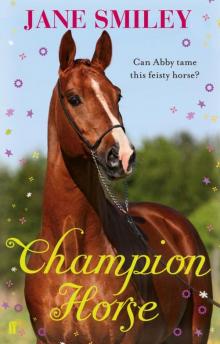 Champion Horse
Champion Horse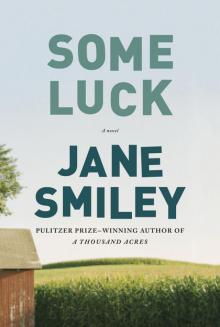 Some Luck
Some Luck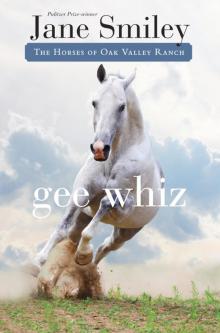 Gee Whiz
Gee Whiz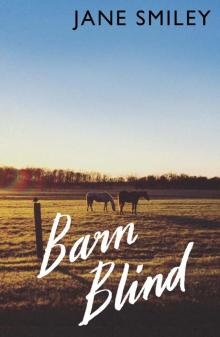 Barn Blind
Barn Blind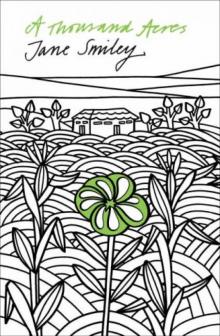 A Thousand Acres (1992 Pulitzer Prize)
A Thousand Acres (1992 Pulitzer Prize)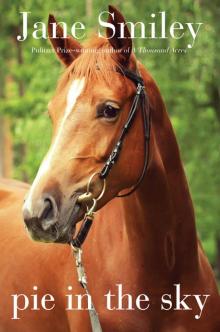 Pie in the Sky
Pie in the Sky True Blue
True Blue A Thousand Acres_A Novel
A Thousand Acres_A Novel A Good Horse
A Good Horse